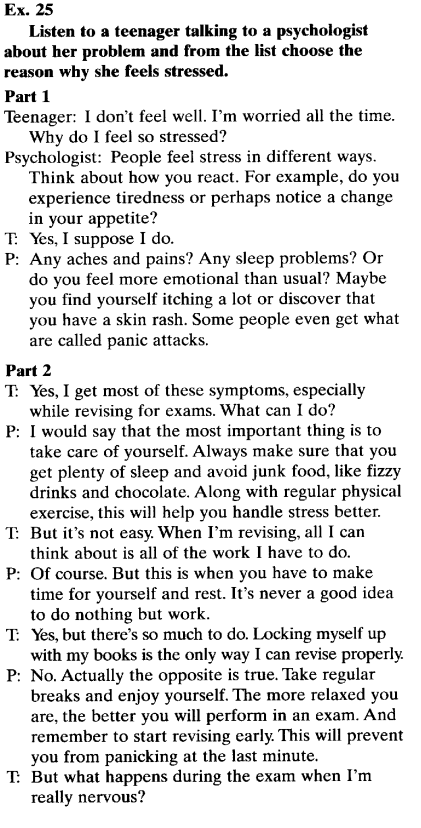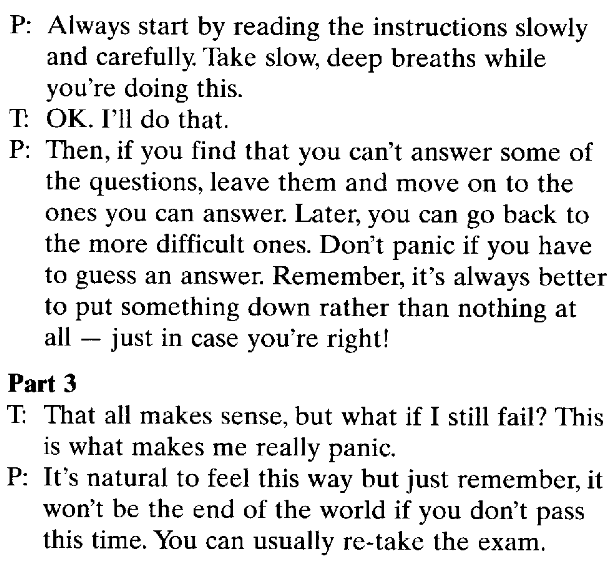План-конспект урока английского языка в 10 классе
Тема урока: Problems at school
Задачи урока:
1. Совершенствование умений аудирования;
2. Совершенствование умения выражать согласие/несогласие, умения аргументировать свою точку зрения в устно-речевом общении;
3. Совершенствование умений работать в группах/парах.
Оборудование: аудиозапись к уроку.
I. Начало урока
Приветствие.
Введение в тему. Создание положительной мотивации.
Greeting
T: Good morning, boys and girls. I’m very glad to see you. I hope you are all feeling well today. How are you? It’s wonderful that you are fine.
Warm-up
T: Is your school life easy or difficult? Are there any problems connected with your school life? Today we are going to discuss some problems connected with schools and the ways of their resolving. The topic of our lesson is “School problems”.
Учитель расспрашивает учащихся об их проблемах в школе.
II. Основная часть урока
- Проверка домашнего задания.
2. Совершенствование умений аудирования с пониманием основного содержания
- Совершенствование умений аудирования с точным пониманием отдельных лексических единиц
3. Совершенствование умений диалогической речи
4. Совершенствование умений аудирования с полным пониманием и умения кратко фиксировать содержание в форме заметок
4. Совершенствование умений говорения
Мовершенствование умений аудирования с целью выделить главное
. Совершенствование умений говорения
Homework
T: Let’s listen to your stories about schools of the 20-th century. One pupil will go to the blackboard to read his/her information. We will listen to him/her carefully. Get ready to ask the questions about the school he/she will describe.
p.15 ex.23
Listening:
T: School life is often connected with different problems. Do you have any problems at school? What are they?
Let’s listen to a teenager talking to a psychologist about her problem. Open your textbooks at p. 16, ex. 24. You can see the list of possible problems why she feels stressed. Who can read them aloud? Is everything clear?
Listen to the dialogue and find the reason of her worries.
p. 16 Ex. 25
Answer:3
Listening
You have read some new words and word combinations in the text. Some parts of them you can find in ex. 26. Write these parts down in your copybooks. Listen to the dialogue again and complete the word combinations.
p.16 ex. 26
Keys:
- tiredness
- change in appetite
- aches and pains
- sleep problems
- itching and rashes
- feeling emotional
- panic attacks
Speaking
So it’s time to work in pairs. Discuss whether you and your partner have similar problems. While speaking use Dialogue Vocabulary given in ex. 27.
p. 16 ex. 27
Listening
Now we are ready to learn the psychologist advice. Open your Workbooks, p. 6, ex. 7. Write down the psychologist’s advice under the following headings.
TB p. 16 ex. 28, WB p. 6 ex. 7
While revising
- Sleep: get plenty of sleep
- Food: eat healthy food
- Physical exercise: do lots of physical activities
- Rest: take regular breaks
- Revising: start revising as early as you can
While taking the exam
- Instructions: read the instructions on the paper carefully
- Breathing: take a few slow deep breaths before you start
- Panic: don’t panic
- Guessing: if you don’t know the answer, have a guess
Now listen to the text again. Put a tick by the tips you follow and a cross by the ones you never do.
Speaking
Now work in pairs. Look through the psychologists again. Work with a partner and find out whether his/her habits are similar to yours.
p. 16 ex. 29
Listening
Listen to the last part of the recording and identify the major advice given by the psychologist. Then put the words in ex. 31 in their correct order.
p. 17 ex. 30
Answer: If you don’t pass your exam, it won’t be the end of the world.
Speaking
Work in groups and agree or disagree with the psychologists’ advice. Give your reasons and explanations.
p.18 ex. 31
Несколько учащихся зачитывают рассказы о школьной жизни своих родственников, затем отвечают на вопросы одноклассников.
(стр.15 упр.23)
Учитель расспрашивает учащихся об их школьных проблемах. Затем учащиеся прослушивают текст о проблемах школьницы и определяют, какая из указанных проблем ее волнует.
(стр. 16 упр. 25)
Учащиеся прослушивают текст и дополняют части слов и словосочетаний, записывая их в тетради.
(стр. 16 упр.26)
Учащиеся обсуждают собственные проблемы в парах, используя сделанные заметки и диалогический словарь из учебника.
(стр. 16 упр. 27)
Учащиеся прослушивают вторую часть текста, фиксируя содержание прослушанного в рабочих тетрадях.
(РТ стр. 6 упр. 7).
Учащиеся прослушивают текст снова и отмечают галочкой те советы, которым они следуют, и крестиком – те, которые никогда не выполняют.
Учащиеся обсуждают советы психолога в парах, сравнивая свои ответы на предыдущее задание.
(стр. 16 упр. 29)
Учащиеся прослушивают последнюю часть аудиотекста и пытаются составить предложение из имеющихся слов.
(стр. 17 упр. 30)
Работа в группах: учащиеся в группах по 4 чел. обсуждают советы психолога. Затем группы суммируют свое мнение и высказываются перед классом.
(Стр. 18 упр. 31)
III. Заключительная часть урока
Объяснение домашнего задания
Рефлексия
Подведение итогов урока
Homework
- TB p. 17 ex. 32
- pictures about School life.
T: Our lesson came to its end. What have we done today? What was difficult for you? What new words have you learnt?
T: You worked great today! Thank you for your work!
Our lesson is over. Good-bye!


















